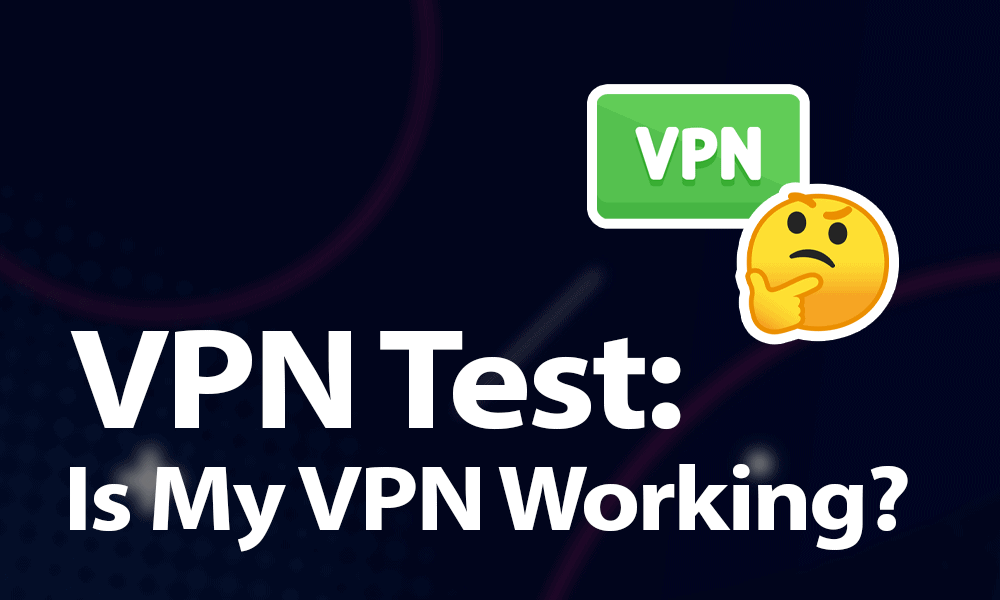VPN Test: Is My VPN Working in 2021?
A virtual private network is a great way to add a bit of security and privacy to your online browsing session. However, a VPN test will tell you whether or not your VPN is doing the job, because if it isn’t, your browsing won’t be as secure as you think. Keep reading to see how to test if your VPN is working.
Our everyday lives all but require us to be online and accessible, but that has opened the door to various malicious online attacks on our privacy. A secure VPN can protect you from that — provided it works. A VPN test can help you find out if your VPN is working or not. We’ll show you how to test a VPN connection for any leaks in this easy-to-follow guide.
Key Takeaways:
- VPNs only work well if they don’t have a problem with DNS, IP or WebRTC leaks, and if they get you solid speeds on your connection.
- All of the leaks are easy to test for, and if you notice your IP isn’t protected, you should change your VPN provider.
- It’s possible for a service to detect you’re using a VPN, but most good VPNs allow you to bypass the detection in different ways.
Your VPN might not work as intended; you might be dealing with VPN leaks such as a DNS leak, a WebRTC leak or an IP leak, which are all things you want to avoid. With that in mind, let’s go over some of the more common VPN tests, so you have a better understanding of whether or not your VPN connection works as intended.
You can test your VPN by running a DNS leak test, an IP address leak test and a WebRTC leak test. It’s also a good idea to run a speed test to find a server that gets you solid speeds when using a VPN.
Yes, you can test that by opening a tool like What Is My IP Address. If the ISP and location are your real ones, you’re not connected to a VPN.
If you notice you have a DNS leak with your VPN, your best option is to change VPN service providers.
You can detect DNS leaks with the DNS Leak Test tool, and you can check for an IP address leak with the IPv6 Test tool. If you get your actual IP address from either of them when you’re connected via a VPN, you have a leak. You can also check for a WebRTC leak by Googling “What’s my IP,” and refreshing the result page with and without a VPN. If you get the same IP address, you’re dealing with a WebRTC leak.
DNS Leak VPN Test
A DNS leak test is very simple to do — all you need to do is connect your VPN, head to a DNS leaks website, such as DNS Leak Test, and see what it says. If it shows your actual location and IP address, you know you’re dealing with a DNS server leak.
What Are DNS Leaks?
DNS, which stands for Domain Name System, is responsible for translating a website’s domain name into an IP address, which is then used by your browser to load the website you’re visiting. The default DNS servers your connection uses are the DNS servers operated by your internet service provider, or ISP. When you use a VPN, you switch to using your VPN’s DNS servers.
A DNS leak means that the DNS queries for translation are leaking from the VPN tunnel, and internet service providers again have access to your browsing data. We’d suggest that you test for VPN leaks like this often, and if you find your real IP address even once, consider changing your VPN provider.
Without a secure VPN, your internet service provider can see which websites you’re visiting, but a VPN keeps that data private. All of the services in our best VPN providers list offer DNS leak protection and will keep your data safe.
IP Leak: Test VPN IP Address Leaks
An IP address leak test is as simple as a DNS leak test, with plenty of online tools available, such as IPv6 Test. When you open the tool, you’ll see an IP address and ISP. If you’re connected to a VPN server and you still see your real IP address and ISP, it means you have an IP address leak.
How Can My IP Addresses Leak?
A VPN needs to protect your IP address. Each internet connection has a unique numerical IP address that can be used to identify it on the internet. You want that to remain private because it carries information about your location and it can be used to link your browsing data to your identity. This is why you should use a VPN for your internet connection.
IP leaks happen most frequently when your VPN connection drops and tries to reestablish itself afterward. This is exactly why most VPN providers, such as NordVPN, include a kill switch that disables your connection completely if it’s not protected. IP leaks happen especially often with free VPN providers and ones that don’t have a kill switch.
If you notice that your real IP has leaked multiple times, or you’re using a VPN without a kill switch, it’s time to switch out your VPN provider. NordVPN is a great option, and you can find out more in our NordVPN review.
WebRTC Leak Test
To test for a WebRTC leak, find your IP address. This is done by Googling “What’s my IP,” and you’ll get your IP address as the result. Then, turn on your VPN of choice and refresh Google’s result page. If your IP address changes, you’re safe. However, if you notice the same IP address, you’re probably dealing with a WebRTC leak and need to consider a different VPN.
What Is a WebRTC Leak?
WebRTC is a browser functionality that allows you to have real-time communication (RTC) with other users online, such as video or voice calls. When a WebRTC leak happens, your real IP is leaked through a browser’s WebRTC API, and your ISP can access it and see what you’re doing.
You can prevent a WebRTC leak by simply using a VPN. VPN tests can help you find out whether or not your VPN actually protects you from a WebRTC leak. If it doesn’t, it’s time to switch to a different one, like CyberGhost, which offers every kind of leak protection (read our full CyberGhost review for more).
It’s also worth noting that you can disable WebRTC. Most browsers allow you to disable WebRTC from within their settings, so if you aren’t using the functionality, you can do that as well.
VPN Speed Test
A VPN speed test is incredibly simple to do, with various online tools offering the functionality. For example, Ookla’s Speedtest measures download, upload and latency. Heading to its website while you have your VPN enabled allows you to measure the speed.
To add to this, some VPNs such as ExpressVPN come with a built-in speed test, which allows you to test the VPN’s speed when connected to a server of your choice (read our full ExpressVPN review for more).
VPN Malware Detection Test
It’s worth noting that not all VPN providers have your best interests at heart, and this is something that’s common with free VPN apps that bundle malware with their installation files. Windscribe and TunnelBear are notable exceptions, but with all other free VPN apps, we’d suggest testing for malware.
You can do this with VirusTotal. Simply upload the VPN’s installation file and the program will scan the file for malware, then let you know whether or not it’s safe. If you can, also have a reliable anti-virus running for added security.
VPN Server Detection: Is It Possible & How to Avoid It
Some websites and services that have geoblocked content don’t really like when their users connect via VPNs — Netflix being a perfect example. Services like this tend to keep a repository of IP addresses they know come from VPN providers, and if they notice that you’re connecting from one of them, they might prevent access.
The solution is to find a VPN provider that changes your public IP address often enough so that it doesn’t get listed in one of those repositories.
Of course, VPNs have some rather creative ways of working around this. You could opt for a VPN service like NordVPN that offers you a personal public IP address that nobody else can use. Or, you also have Surfshark’s obfuscated servers, which disguise your VPN-protected traffic as regular traffic so that servers can’t detect you’re using a VPN (read more about the VPN in our Surfshark review.
Final Thoughts: VPN Test
All things considered, a VPN can only protect you if it works as intended. Fortunately, there are a few easy ways to see if that’s the case. You can do the basic VPN tests mentioned above to make sure you aren’t dealing with any kind of VPN leak and your IP address is private and secure.
What do you think of our guide? Did you try any VPN test to make sure your IP address is secure? Which VPN do you use and trust? Let us know in the comments below. Thanks for reading.


